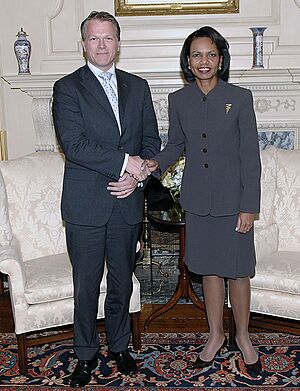Wouter Bos facts for kids
Quick facts for kids
Wouter Bos
|
|
|---|---|

Bos in 2007
|
|
| Deputy Prime Minister of the Netherlands | |
| In office 22 February 2007 – 23 February 2010 Serving with André Rouvoet
|
|
| Prime Minister | Jan Peter Balkenende |
| Preceded by | Gerrit Zalm |
| Succeeded by | André Rouvoet |
| Minister of Finance | |
| In office 22 February 2007 – 23 February 2010 |
|
| Prime Minister | Jan Peter Balkenende |
| Preceded by | Gerrit Zalm |
| Succeeded by | Jan Kees de Jager |
| Leader of the Labour Party | |
| In office 19 November 2002 – 25 April 2010 |
|
| Deputy |
See list
Klaas de Vries
(2002–2006) Jeltje van Nieuwenhoven (2002–2004) Sharon Dijksma (2004–2007) Jacques Tichelaar (2007–2008) Mariëtte Hamer (2008–2010) Jeroen Dijsselbloem (2008–2010) |
| Preceded by | Ad Melkert |
| Succeeded by | Job Cohen |
| Parliamentary leader in the House of Representatives |
|
| In office 19 November 2002 – 22 February 2007 |
|
| Preceded by | Jeltje van Nieuwenhoven |
| Succeeded by | Jacques Tichelaar |
| Parliamentary group | Labour Party |
| State Secretary for Finance | |
| In office 24 March 2000 – 22 July 2002 |
|
| Prime Minister | Wim Kok |
| Preceded by | Willem Vermeend |
| Succeeded by | Steven van Eijk |
| Member of the House of Representatives | |
| In office 23 May 2002 – 22 February 2007 |
|
| In office 19 May 1998 – 24 March 2000 |
|
| Parliamentary group | Labour Party |
| Personal details | |
| Born |
Wouter Jacob Bos
14 July 1963 Vlaardingen, Netherlands |
| Political party | Labour Party (from 1981) |
| Residences | Amsterdam, Netherlands |
| Alma mater | Vrije Universiteit Amsterdam (Bachelor of Social Science, Master of Social Science, Bachelor of Economics, Master of Economics) |
| Occupation |
|
Wouter Jacob Bos, born on July 14, 1963, is a Dutch politician who is now retired. He was a key member of the Labour Party (PvdA) and also a businessman.
Contents
Early Life and Education
Wouter Bos grew up in Vlaardingen, Netherlands. His family had a background in social democracy and Protestant beliefs. His father started a group called ICCO, which helps with development around the world.
School Days
From 1969 to 1974, Wouter went to an elementary school in Odijk. He then attended the Christelijk Lyceum, a high school in Zeist, from 1974 to 1980. He focused on science and classical studies there. After high school, he spent a year in the United Kingdom as a volunteer instructor for the YMCA.
University Studies
In 1981, Bos started studying Political science at the Vrije Universiteit Amsterdam. A year later, he also began studying Economics. He was a very good student, graduating with honors in both subjects in 1988. He earned degrees in both Social Science and Economics.
Career Before Politics
Before becoming a politician, Wouter Bos worked for a large company called Royal Dutch Shell for ten years, from 1988 to 1998. This was unusual for a Dutch left-wing politician, as many come from different backgrounds. Bos believed that people from the left side of politics should also work in the business world.
Roles at Shell
- 1988-1990: He worked as a management consultant at the Pernis Refinery. He helped with training and making changes to how the company was organized.
- 1990-1992: He became an advisor for the central board, focusing on how the company worked with its employees.
- 1992-1993: He moved to Romania to help set up Shell's branch there.
- 1993-1995: In Hong Kong, he managed staff planning and development for Shell in Greater China. This involved hiring new managers for places like South Korea and China.
- 1996-1998: He returned to Europe, working in London as a consultant for new markets. He looked for opportunities to buy companies in developing countries.
In 1998, he left Shell to begin his political career in the Netherlands.
Political Journey
Wouter Bos joined the Labour Party (PvdA) in 1981. His political career began in the late 1990s.
Entering Parliament
In 1998, Bos was elected as a Member of the House of Representatives, which is part of the Dutch parliament. He focused on financial matters. He was appointed as State Secretary for Finance in March 2000. In this role, he helped manage taxes and money for the government. He worked with the Finance Minister to change the tax system.
After the 2002 election, Bos returned to parliament as a Member of the House of Representatives. He became a spokesperson for income policy and health.
Becoming Party Leader
In 2002, the Labour Party's leader, Ad Melkert, stepped down after an election loss. Wouter Bos decided to run for the leadership position. He won the election, becoming the new leader of the Labour Party and its top candidate for the next election. He took office on November 19, 2002.
In the 2003 election, the Labour Party gained many seats, almost doubling their number from 23 to 42. This success was partly due to Bos's energetic and youthful image. However, the Christian Democratic Appeal (CDA) party remained the largest. Talks to form a government between Bos's party and the CDA did not succeed.
Leading the Opposition
As the leader of the largest opposition party, Bos worked to improve the Labour Party's organization and public image. Some people criticized him for being too quiet on important issues. Despite this, he remained popular with the public. In 2005, he announced that he wanted to become Prime Minister of the Netherlands if the Labour Party became the biggest party in the next election. The Labour Party did well in the local elections in 2006, becoming the largest party in local governments.
Government Roles

In the 2006 general election, the Labour Party lost some seats. However, they still formed a government with the Christian Democratic Appeal (CDA) and the Christian Union (CU). This new government was called the Fourth Balkenende cabinet. Wouter Bos became the Deputy Prime Minister of the Netherlands and Minister of Finance on February 22, 2007.
The government faced a challenge in 2010 over whether Dutch troops should stay in Afghanistan. This disagreement caused the government to fall on February 20, 2010. Bos and other Labour Party members resigned on February 23, 2010.
Retirement from Politics
On March 12, 2010, Wouter Bos announced that he was leaving national politics. He did not run in the 2010 election and suggested Job Cohen as his successor.
Life After Politics
After leaving national politics, Wouter Bos started working in both private companies and public organizations.
- 2010: He became a partner at a financial services company called KPMG.
- 2012: After the 2012 election, he helped in the process of forming a new government.
- 2013: He was chosen to be the chairman of the board of directors for the VU University Medical Center.
- 2018: He became the chairman of the board of directors for the Netherlands Investment Agency.
- 2022: As of 2022, he is the chairman of Menzis, a health insurance company.
Bos also works as a lobbyist, representing the government in economic discussions.
Personal Life
In December 2002, Wouter Bos married Barbara Bos. They have two daughters, Iris (born February 5, 2004) and Jula (born January 3, 2006), and a son, Joppe (born April 18, 2009).
Decorations
| Honours | ||||
| Ribbon bar | Honour | Country | Date | Comment |
|---|---|---|---|---|
| Officer of the Order of Orange-Nassau | Netherlands | 3 December 2010 | Elevated from Knight (10 December 2002) | |
Images for kids
-
Wouter Bos with former Prime Minister Wim Kok and Labour Party Leader Job Cohen at a party conference in Amsterdam on May 1, 2011.
 | Stephanie Wilson |
 | Charles Bolden |
 | Ronald McNair |
 | Frederick D. Gregory |


